Related Research Articles
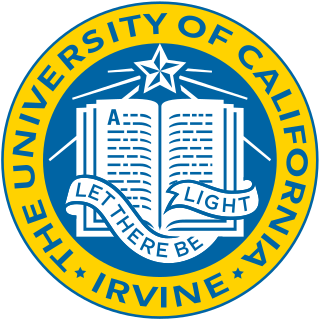
The University of California, Irvine, is a public land-grant research university in Irvine, California. One of the ten campuses of the University of California system, UCI offers 87 undergraduate degrees and 129 graduate and professional degrees, and roughly 30,000 undergraduates and 6,000 graduate students are enrolled at UCI as of Fall 2019. The university is classified among "R1: Doctoral Universities – Very high research activity", and had $523.7 million in research and development expenditures in 2021. UCI became a member of the Association of American Universities in 1996.

Ralph John Cicerone was an American atmospheric scientist and administrator. From 1998 to 2005, he was the chancellor of the University of California, Irvine. From 2005 to 2016, he was the president of the National Academy of Sciences (NAS). He was a "renowned authority" on climate change and atmospheric chemistry, and issued an early warning about the grave potential risks of climate change.

Bruce Michael Alberts is an American biochemist and the Chancellor’s Leadership Chair in Biochemistry and Biophysics for Science and Education, emeritus at the University of California, San Francisco. He has done important work studying the protein complexes which enable chromosome replication when living cells divide. He is known as an original author of the "canonical, influential, and best-selling scientific textbook" Molecular Biology of the Cell, and as Editor-in-Chief of Science magazine.
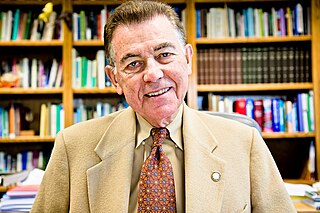
Francisco José Ayala Pereda was a Spanish-American evolutionary biologist, philosopher, and Catholic priest who was a longtime faculty member at the University of California, Irvine and University of California, Davis.
Simon Asher Levin is an American ecologist and the James S. McDonnell Distinguished University Professor in Ecology and Evolutionary Biology and the director of the Center for BioComplexity at Princeton University. He specializes in using mathematical modeling and empirical studies in the understanding of macroscopic patterns of ecosystems and biological diversities.
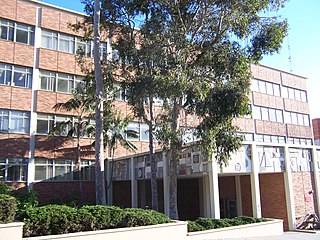
The UCLA College of Letters and Science is the arts and sciences college of the University of California, Los Angeles (UCLA). It encompasses the Life and Physical Sciences, Humanities, Social Sciences, Honors Program and other programs for both undergraduate and graduate students. It is often called UCLA College or the College, which is not ambiguous because the College is the only educational unit at UCLA to be currently denominated as a "college." All other educational units at UCLA are currently labeled as schools or institutes.
The School of Biological Sciences is one of the academic units of the University of California, Irvine (UCI). The school is divided into four departments: developmental and cell biology, ecology and evolutionary biology, molecular biology and biochemistry, and neurobiology and behavior. With over 3,700 students it is in the top four largest schools in the university. It is consistently ranked in the top one hundred in U.S. News & World Report’s yearly list of best graduate schools.

Michael A. Marletta is an American biochemist. He was born in Rochester, New York, the son of Italian immigrants. He graduated from the State University of New York at Fredonia in 1973 with an A.B. degree in biology and chemistry, and from the University of California, San Francisco in 1978 with a Ph.D. degree in pharmaceutical chemistry, where he studied with George Kenyon. He was a postdoctoral fellow with Christopher T. Walsh at MIT from 1978-1980 and continued as a faculty member at MIT from 1980-1987 whereupon he joined the faculty of the University of Michigan, Ann Arbor. He was John G. Searle Professor of Medicinal Chemistry in the college of pharmacy and professor of biological chemistry at the University of Michigan. In 2001, he moved to the University of California, Berkeley to assume roles as Aldo DeBenedictis Distinguished Professor of Chemistry and professor of biochemistry and molecular biology, and served as the chair of the department of chemistry from 2005 until 2010. He was a Howard Hughes Medical Institute Investigator. From January 2012 to August 2014, Marletta was president and CEO of The Scripps Research Institute in La Jolla, California, succeeding Richard Lerner.
Michael T. Goodrich is a mathematician and computer scientist. He is a distinguished professor of computer science and the former chair of the department of computer science in the Donald Bren School of Information and Computer Sciences at the University of California, Irvine.
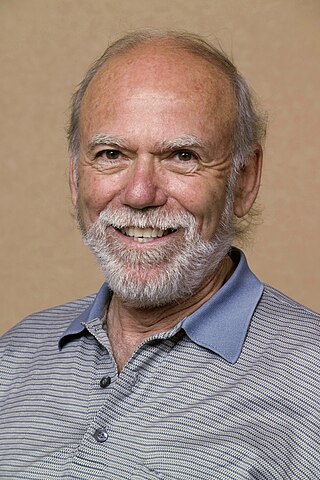
Barry Clark Barish is an American experimental physicist and Nobel Laureate. He is a Linde Professor of Physics, emeritus at California Institute of Technology and a leading expert on gravitational waves.

Diana Harrison Wall is the founding director of the School of Global Environmental Sustainability, a distinguished biology professor, and senior research scientist at the Natural Resource Ecology Laboratory at Colorado State University. She is an environmental scientist and a soil ecologist and her research has focussed on the Antarctic McMurdo Dry Valleys. Wall investigates ecosystem processes, soil biodiversity and ecosystem services and she is interested in how these are impacted by global change. The Wall Valley was named after her in recognition of her research in the McMurdo Dry Valleys. Wall is a globally recognised leader and speaker on life in Antarctica and climate change.
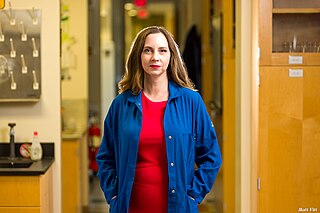
Kathleen Kay Treseder is an American ecologist who specializes in the interplay between global climate change and fungal ecology. She also serves as a member of the Irvine City Council after being elected to the position in 2022. She is currently a professor in the Department of Ecology and Evolutionary Biology at the University of California, Irvine. She is a Fellow of the American Association for the Advancement of Science, the American Academy of Microbiology, and the Ecological Society of America.
James Standish Clegg is a Professor Emeritus of Biochemistry at University of California, Davis, based at the Coastal and Marine Sciences Institute (CMSI) in Bodega Bay, California. He served as director of the Bodega Marine Laboratory (BML) from 1986 to 1999 and as president of the National Association Marine Laboratories (NAML) from 1991 to 1993.
Albert Farrell Bennett is an American zoologist, physiologist, evolutionary biologist, author, and academic. He is Dean Emeritus of the School of Biological Sciences at University of California, Irvine.
References
- 1 2 "Michael Clegg CV" (PDF). Retrieved 2018-11-02.
- ↑ "Michael T. Clegg". National Academy of Sciences. Retrieved 2018-11-02.
- 1 2 "Michael T. Clegg". University of California, Irvine. Retrieved 2018-11-02.
- ↑ "Michael Clegg, IIASA Council Chair". IIASA. Retrieved 2018-11-02.